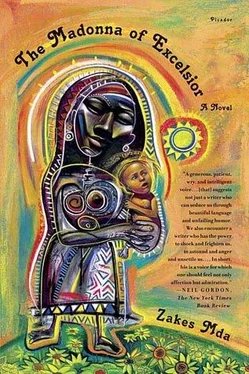“Do not alienate your allies, Abuti Sekatle,” pleaded Popi. “You know that in the council chamber I have supported the Baipehi. I have fought for them to be given land of their own which must have all the infrastructure.”
“An ally who accuses me of stealing money from poor people is no ally at all. And please, there is the door. I am a very busy man.”
Popi left the store fuming.
Viliki was alarmed when she arrived at his house at night.
“Is there something wrong with the old lady?” he asked. Although Niki was only fifty, he called her “the old lady”. And she indeed looked much older than her years. It was because her face had been eroded by the skin-lighteners of her youth.
“There is nothing wrong with Niki,” said Popi. “Can’t I visit my brother without him getting suspicious?”
THE NEXT DAY the council was taken aback when Popi moved that the Baipehi should be removed immediately. By force, if necessary. Lizette de Vries seconded the motion. There was a division in the chamber. Popi, the three members of the National Party and Tjaart Cronje voted for the motion. The four members of the Movement opposed it. And lost. Viliki gleefully announced that the services of a private company would be engaged to remove the squatters and their camp.
The Baipehi were given one week to vacate the land. Under the revolutionary leadership of Sekatle, they stood their ground. The deadline was extended twice — by one week each time. Still they refused to move. Instead they cultivated their gardens to demonstrate that they were there permanently. Viliki seemed to be wavering.
“You cannot show signs of weakening now, Viliki,” Popi egged him on. “No one will ever respect you again if you don’t take action against those arrogant Baipehi. Sekatle needs to know that you are the mayor, not him.”
The following month, bulldozers came thundering down the dusty roads of Mahlatswetsa Location. Men in orange overalls descended upon the squatter camp and systematically uprooted the makeshift houses. They loaded the corrugated-iron and plastic sheets, the poles and cardboard, onto a truck. Those structures that were stubborn were flattened by the bulldozers. Men, women and children ran helter-skelter in the mushrooms of dust to salvage their precious belongings. Others pleaded with the men in orange overalls to be merciful.
“How can you do this to us?” they asked. “We are black people like you.”
“It is not for us to be merciful,” said their foreman. “We are paid by your town council to remove this squatter camp. Go ask them for mercy. We are just doing our job.”
Sekatle called an urgent branch meeting of the Movement. The Pule Comrades had gone too far. They had to be sanctioned. They had to be disciplined. Everyone was accusing the Movement-controlled council of resorting to the tactics of the past.
“We had thought that bulldozers were history,” said Sekatle at the branch meeting. “Today we have seen what we used to see during the worst excesses of apartheid. We never thought we would see the day when a town council that was controlled by the Movement would vote with the Boers to drive away our people from their own land in their own country!”
“We have no blood on our hands,” said the other four council members of the Movement. “We voted against the motion.”
“Obviously Viliki and his sister think that they are bigger than the Movement,” said Sekatle. “They forget that in the same way that we made them what they are, we can unmake them.”
WE LOOKED at these events with foreboding. We all accepted that a war had been declared against the Pule Comrades.
THE MEMBERS of the Movement wanted to table the issue of the forced removals once more in the council chamber. But Viliki ruled that there was no point in discussing it. It would be a waste of time. There were other important matters on the agenda, such as the construction of the new library in Mahlatswetsa Location.
“Does the mayor think that a library is more important than the lives of our people who have been treated worse than they used to be in the days of apartheid?” asked a councillor from the Movement.
“We voted on the matter, Comrade,” said Viliki, “and this council passed a motion that the squatters should be removed. We gave them ample warning. The question of the library is very important.”
“Indeed a library is important,” said Lizette de Vries. “The plans to build one in Mahlatswetsa have been there for a long time. from the time when my husband was the Administrator of the township. It is now time for action.”
“The library we are talking about has nothing to do with your husband, Mrs de Vries,” said Popi sneeringly. “We are talking of the library that this Movement-led council plans to build for the people of Mahlatswetsa.”
“I think even before you can talk of a library, you must get your people to pay for services,” said Tjaart Cronje. “The white citizens of Excelsior cannot afford to subsidise your people. Like everyone else, you must pay rates, you must pay for water, you must pay for sewerage.”
Tjaart Cronje had raised a sore point. Almost every household in Mahlatswetsa Location was in arrears. Even the town councillors themselves. Except for the Pule Siblings who wanted to lead by example, and paid on time every month.
“This culture of non-payment was cultivated by the Movement,” said Lizette de Vries. “Now that the Movement is in power, it must bear the consequences.”
“It is true that when we were fighting for freedom, we encouraged people not to pay for services,” admitted Viliki. “It was part of the war for freedom. But unfortunately the culture of nonpayment set in. People got used to not paying. Now even though we are free, they refuse to pay.”
“As a result, the town council has no money,” said a member of the National Party.
“In the same way that they taught people not to pay, they must now teach them to pay,” said another.
“Are we still talking about the library, Mr Chairperson?” asked Popi.
“Of course we are,” screeched Tjaart Cronje. “People who don’t pay for services do not deserve a library. In any event, black people have other priorities. A library will be a white elephant. It’s like casting pearls before swine.”
“You call my people swine?” said Popi.
“Black people can’t read,” heckled Tjaart. “A library is a waste of resources.”
“If there are no resources it is because you and your people stole them,” said Popi. “So now we are taking them back. If black people don’t read, then we are going to cultivate a new culture of reading.”
“What do you know of culture when you can’t even shave your legs?” asked Tjaart Cronje, looking at Popi’s legs with disgust.
“Tjaart!” admonished Lizette de Vries. “You can’t talk to a lady like that.”
“She is no lady,” insisted Tjaart Cronje. “Ladies shave their legs. She doesn’t. She is therefore no lady.”
There was utter silence. Tears swelled in Popi’s eyes.
For the first time, the honourable members of the council could hear crowds of Baipehi dancing the toyi-toyi dance outside the Stadsaal. Viliki could distinctloudiney hear Sekatle’s voice leading the chants.
The Mayor is a sellout! Hayi! Hayi! Hayi! Down with Viliki! Hayi! Hayi! Hayi!
THE PENNY-WHISTLE. We still call it a flute. But the coloured girl has graduated from birdlike twitters to the gurgling sounds of river spirits. And her face has been tanned brown by the busker’s sun. Patchy brown. Her true yellow-coloured complexion peeps through in places. A tattered brown felt hat sits on her head, covering her forehead to the eyebrows. Hiding her golden-red locks. Her round eyes are wide and her brown pupils threaten to pop out and start bouncing on the brown ground to the rhythm of her melody. Her body is covered in a brown blanket. She kneels on the ground as the deep mellow notes and the shrill piccolo-like notes send shivers of prayer to those who are sleeping under it. Her fingers have learnt to close and open the six holes of the rusty metal instrument in the most dextrous manner, producing sounds that wriggle like water snakes in a warm current.
Читать дальше












